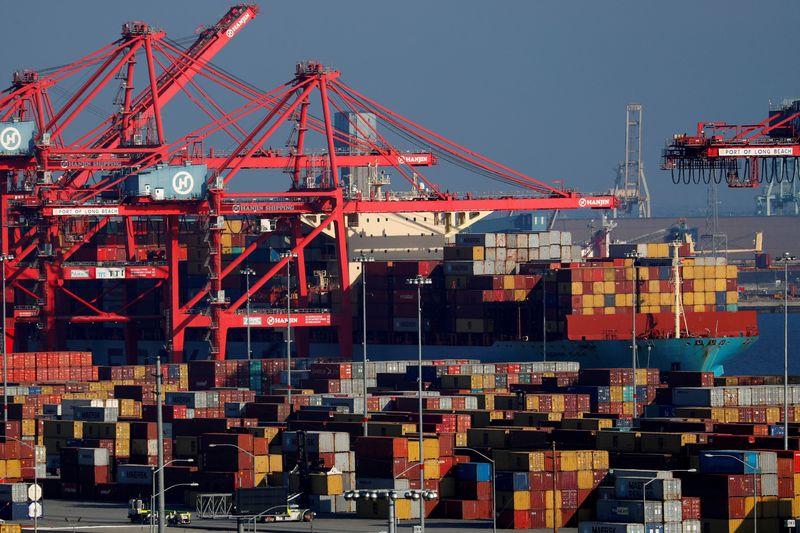By Mike Dolan
LONDON (Reuters) -As "fragmentation" of politics and economics becomes the new buzzword for a world that appears to be splintering into blocs, the related costs of the new order are only now being totted up.
The bank stresses of March have tended to obscure a further souring of big power relations this year as global investors navigate crisis after crisis and struggle to prioritize competing geopolitical and even "geoeconomic" narratives.
Russia's self-inflicted isolation from major G7 and European Union economies since it invaded Ukraine over a year ago has given way to even more economically significant tensions between the West and China over Beijing's explicit support for Moscow and sabre rattling on both sides surrounding Taiwan.
Wednesday's planned meeting between U.S. House Speaker Kevin McCarthy and Taiwan President Tsai Ing-wen in California is yet another episode in a rapidly freezing bilateral atmosphere.
But the International Monetary Fund on Wednesday went some way to blending the political and economic costs this week, modelling the hit to cross-border finance and investment of major nations at loggerheads and the formation of political blocs.
Measuring geopolitical tension via countries' voting behaviour at the United Nations General Assembly, the IMF estimated that a divergence akin to what has happened to Sino-U.S. relations since 2016 could cut cross-border portfolio investment flows and bank credit by 15%.
Along with a threat of sudden reversals of foreign investor flows, it said "macro financial stability risks" related to such tensions included sharp increases in funding costs for weaker banks, associated damage to credit provision and longer-term volatility from reduced international diversification.
Corporate rethinking of foreign direct investment (FDI) - bricks-and-mortar developments overseas as well as mergers and acquisitions - would make the hit even scarier. The IMF cited data showing FDI had already more than halved from 3.3% of world output in the first decade of this century to just 1.3% in the four years since 2018 and that was just a taster of the problem.
"A fragmented global economy is likely to be a poorer one," it said, with FDI flows already increasingly concentrated between politically aligned countries - so-called friend shoring.
"If geopolitical tensions were to increase and countries were to move farther apart along geopolitical fault lines, FDI is likely to become more concentrated within blocs of aligned countries," it said.
And if FDI fragmentation is defined by a permanent rise in cross-bloc barriers to imported investment inputs, the IMF said developments could cut world output by 2% in the long term.
REALIGNMENT FACTS
In a study entitled "Pandemic, War, and the Future of Trade," Boston Consulting Group earlier this year estimated that the net impact of splintered geopolitics will be to slow world trade growth below global output growth over the next nine years - a 2.3% annual pace versus 2.5% projected world GDP growth.
But trade would still advance and so this was not de-globalisation per se, it said.
Driven largely by severing energy ties, it saw EU trade with Russia shrinking by $262 billion by 2031 while Europe's trade with the United States will rise by $338 billion over the same period. Trade between the United States and China is seen falling by $63 billion in that time frame, while Russia's trade with China and India will grow by $110 billion.
BCG Managing Director Marc Gilbert was more upbeat about how the different blocs would reform and how many "third country" mid-tier emerging economies may benefit - the likes of Indonesia or Brazil for example. As it stood, globalisation had become too "brittle," he said.
"One effect of slowing Western trade with both Russia and China will be a corresponding rise in commerce between northern and southern regions as countries find new trading partners in Africa, South America and Southeast Asia," Gilbert pointed out, showing ASEAN countries as "clear winners" with new trade with China, Japan, U.S. and EU over that time projected to be more than $1 trillion.
Companies worldwide now needed to embed geopolitical scenarios into capital allocation and strategic planning, Gilbert said. "Geopolitical planning was for years a side issue in government relations departments - now it's in the C-suite."
And for financial markets, fragmentation is top of mind too.
Saxo Bank dubbed its quarterly outlook this week "The Fragmentation Game" - identifying structurally higher global inflation, access to energy and key commodities, and a greater value put in tangible assets as some key themes coming from it.

"It's essentially the strategic geopolitical dynamic of ensuring more robust access to energy, technology and defence among large competing nation states," said Saxo equity strategist Peter Garnry. "Fragmentation of the global economy will likely put inflation at a higher structural level, and the cost of capital will likely go up, squeezing low-quality and leveraged companies."
The opinions expressed here are those of the author, a columnist for Reuters.
(By Mike Dolan, Twitter: @reutersMikeDEditing by Matthew Lewis)